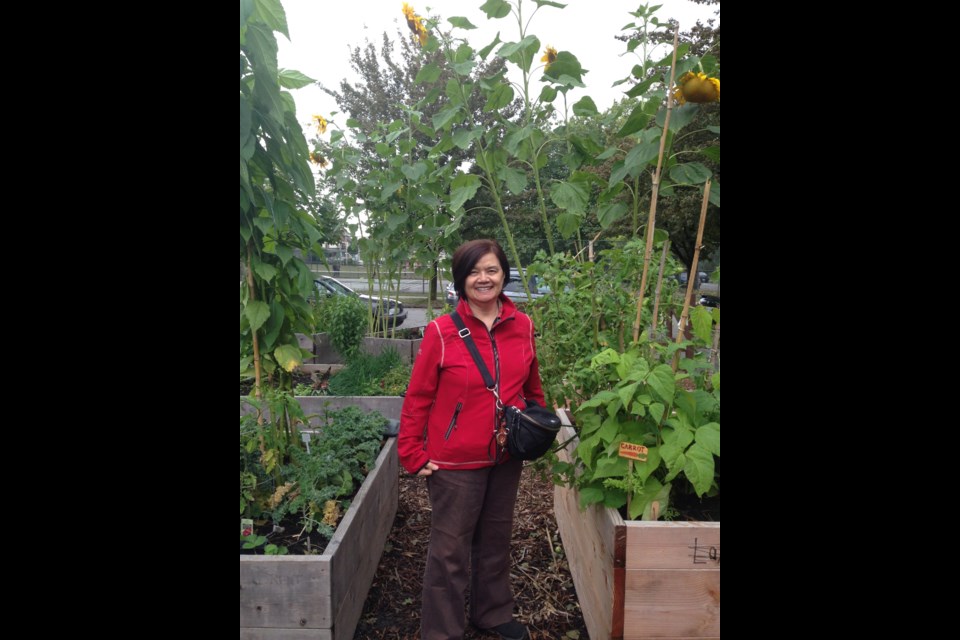A Vancouver project is proving that community gardening is beneficial for the well-being of those living with mental illness.
The three-year-long, community-based participatory project, entering its final year, features two community gardens. One is located in East Vancouver and the other at Vancouver Coast Mental Health’s downtown Resource Centre.
Dr. Melinda Suto, an associate professor with UBC’s Department of Occupational Science and Occupational Therapy, is the principal investigator. She is researching the benefits of community gardening on those living with severe mental illness in supportive housing.
“It’s really important that you as a researcher are actually doing research that’s meaningful for people who are a part of it,” Suto explained.
“From [the gardener’s] perspective the project is fun and it’s something to learn and we try not to emphasize the research project,” she added.
The project involves three components — gardening, community and learning. Along with growing vegetables and fruits, gardeners meet weekly with horticultural therapist Shelagh Smith.
“She’s really the backbone of the program that goes on,” Suto said. “Without that I think we would have a lot different outcomes right now.”
Shurli Chan, who joined the program last March, said it’s become an important part of her well-being.
She was diagnosed with bipolar, ADHD and anxiety disorder more than seven years ago. After retiring from work at UBC in 2007, she had difficulty coping with her illness and became homeless in Vancouver’s Downtown Eastside.
“The one thing I feared more than anything else was going homeless, which turned out to be a blessing in disguise,” she said. “I found out what was wrong with me and it’s genetic more than anything else.”
Through a lot of hard work, therapy and lifestyle changes she was better able to manage her mental health. She is now the client director of the board at Coast Foundation Society and gardens and practises meditation as part of a healthy lifestyle.
“Mental wellness to me is being able to learn to accept yourself for who you are, faults and all,” she said. “There’s no other person on this planet like you, it makes you unique it gives you something that you can give, your gift to humanity, because everybody needs a purpose.”
She said one of the many benefits of gardening is the access to healthy food and self-sufficiency.
“Watching something grow is just wonderful and when you can eat it then you don’t have to worry about the cost of food and more importantly what they put on it — pesticides and that kind of thing,” she said.
Chan said her greatest gardening accomplishment to date has been growing a large orange pepper. She’s also grown heather, bok choy and has begun growing other vegetables on her balcony.
She also enjoys the strong sense of community the project has created. Gardeners share gardening skills and care for one another’s plants.
“We create friendships, a social community and the best way of healing is when you have a whole group of people all exercising together and working together and just talking to each other,” she said. “I just consider myself very blessed.”
Peter Brannan was affected by mental illness later in life and has since benefitted from the gardening program. He’s grown radishes, tomatoes, potatoes, mustard seed, brussels sprouts, broccoli and herbs.
“It gives me something to focus on and think about and there’s something nice about plants, they don’t give you a hard time, they respond to the care you take with them and it’s lovely to see them growing when you care for them,” he said.
One of his favourite parts of the program is learning how to use the fruits and vegetables he grows in the kitchen. He especially enjoys the drinks volunteer Sara Warkentin has taught them to make at weekly meetings.
“You learn how to eat healthier foods, that’s an important thing and also when I go shopping for vegetables I know what to look for now,” he explained.
He said the program has also made him more sociable and encouraged him to get involved with Coast Mental Health.
“I used to go for long periods of time without talking to people and now I don’t. It’s helped me in my social connections,” he said.
Horticultural therapist Shelagh Smith has seen the gardeners blossom along with their plants.
“I absolutely love doing this because I see people enjoying themselves and learning at the same time,” she said.
She especially enjoys when people make connections between the food they eat and how it grows.
“The excitement they get when something that they grew from seed actually makes a tomato or makes a butternut squash or they pull out of the ground a beet or a carrot, all of those moments just make me so happy to see them so happy and so proud of what they’ve done,” she said.
Suto has also seen the benefits of the project on the gardeners and she’s learned from that.
“It’s really helping me to understand this concept of belonging and how do you create and have your gardeners help you create an environment where people feel like they belong,” she said.
Suto wants the gardeners to carry on the project once the research has concluded. She said it could become a model for similar projects in other cities. She also hopes to present the results partly through a process called “photovoice,” during which participants present their own perspective of the results through photographs.



